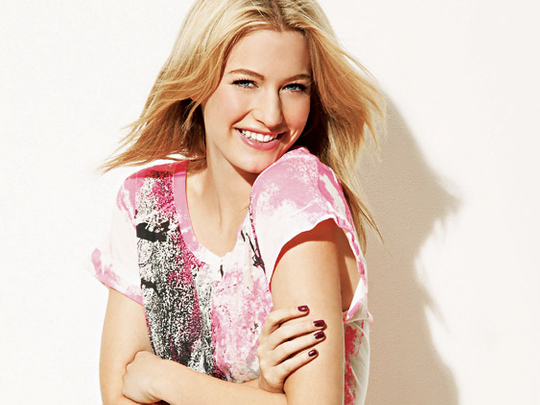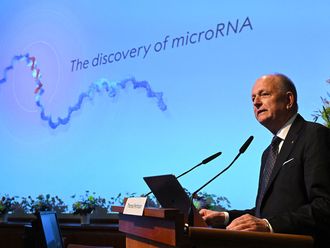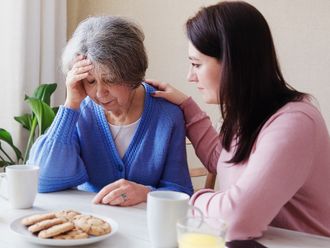
1. How common isbreast cancer?
In 2010, experts predict 1.5 million people worldwide will be diagnosed with breast cancer. It is the most common form of cancer in women in the UAE and globally. According to the Health Authority Abu Dhabi's 2009 Annual Report, in Abu Dhabi alone, more than 130 women develop breast cancer each year.
For years, women over the ageof 45 were considered most at risk, but today, as an increasing number of younger women are being diagnosed, being aware of the signs and getting symptoms checked out early is key to increasing your survival chances. According to Zeina Kassem, oncology clinic manager at American Hospital Dubai, "Women diagnosed with early breast cancer through early detection, where the cancer is small and has not yet spread, have a more than 90 per cent chance of survival or cure - especially with the tailored treatments that arenow available for different types of breast cancer."
2. What are the symptoms?
A breast lump is the first symptom in nine out of ten breast cancers. Other symptoms to look out for are: thickening in an area of the breast; a change in the size or shape of a breast; dimpling of the skin; a change in the shape of your nipple, particularly if it turns in, sinks into the breast, or has an irregular shape; blood stained discharge from the nipple; a rash on a nipple or surrounding area; or a swelling or lump in your armpit.
Like breast lumps, these signs don't necessarily mean cancer, but getting them checked out by your GP will determine whether they are benign or need further treatment. Remember, catching the cancer in its early stages will give you the best chance of successful treatment.
3. Does taking the contraceptive pill increase the risk of developing breast cancer?
Research has shown that usingoral contraceptives (birth controlpills) appears to slightly increasea woman's risk of breast cancer,but only for a limited period of time. Women who stopped using oral contraceptives more than ten years ago do not appear to have any increased breast cancer risk.
4. What should you do if you find a lump or develop any of the symptoms?
"The most important thing is never to neglect it," says Zeina. "Seek medical help immediately so that treatment won't be delayed - this might save your life. Research has proved, time and again, that early detection is key to curing women of breast cancer."
5. What is the best defence against breast cancer?
According to Zeina, self examination is the most effective screening method. For a five-step guide on how to self examine, visit www.breastcancer.org/symptoms.
As well as regular self examinations, clinical screening is vital. According to medical experts, women over 20 should have a clinical examination by their doctor each year, while women over 45 should have annual mammograms.
Consultant radiologist Dr Victoria Stewart, explains: "Screening aims to detect cancer before it has spread, so it is the best defence. In Muslim countries such as the UAE, breast screening can be a sensitive issue and sometimes requires the permission of the husband, so men also need to be aware of the importance of breast screening and diagnosis. I have had a situation where a woman who we knew had a cancer would not let us take a biopsy without her husband's permission. So education and awareness in places like the UAE is important."
6. How are pregnancy, childbirth and breastfeeding linked to reducing breast cancer risk?
There is significant scientific evidence of a fundamental link between a woman's child-bearing history - how many children she has, how old she was when she had them and whether she breastfed or not - and her likelihood of developing breast cancer. "Essentially, if a woman has many children and breastfeeds them for quite a while, her risk of breast cancer is much reduced," Professor Valerie Beral, professor of epidemiology at Oxford University and a leading expert on the risks and causes of breast cancer, is quoted as saying in an interview with Cancer Research UK. "We know from very thorough worldwide data with hundreds of thousands of women and comparison groups that a pregnancy isn't what's protective, it's actually a birth. A pregnancy lasts nine months and it gives you life-long protection against breast cancer… We really should be finding out why this is - it must be some of the hormones that are produced that make the breasts change and so a treatment over a number of months at a young age could give you life-long protection - that's where we should be heading."
7. What other factors are related to risk?
Like most cancers, the single biggest risk factor for breast cancer is increasing age. According to Cancer Research UK, there is a simple reason for this: cells have to ‘go wrong' to turn into cancer cells and the longer we are alive, the more time there is for that to happen. There is nothing we can do to reverse the ageing process, but regular self examination and screening will help to detect early signs of breast cancer while it is still in its primary stages.
According to Dr Aaron Han, chief of pathology at American Hospital Dubai, controllable risk factors include certain lifestyle choices, such as smoking and obesity. Studies have shown that regular exercise can lower your risk by about a third.
Excessive alcohol consumption and hormone replacement therapy can also increase your risk. "We know that alcohol increases the risk of breast cancer - you can estimate that of the 45,000 cancers in the UK, about 5,000 of them are caused by alcohol. Another factor is hormone replacement therapy, there are about 1 million women using HRT and that's another 1,000 fewer breast cancer cases if no women were taking it," says Professor Beral. Family history is another risk factor.
8. Is it possible to be tested for cancer genes?
Anyone with a strong family history of breast cancer should be tested for cancer genes because if they are at risk, screening at a young age is vital. Dr Stewart explains, "If you have a strong family history such as your mother or even your father's aunt having been diagnosed at an early age (below 50), then you may need early screening. There are certain computer programs which now calculate your risk and whether you require early screening, so if you have a strong family history then it is advisable to visit a family history clinic where they can calculate the risk."
He says both a mammography and an MRI can be used for more accurate screening as an MRI is more sensitive. "We know that there are certain people who carry genes which predispose them to having cancer. The most well-known are BRCA1 and BRCA2. These people are at substantially increased risk of developing breast cancer, men included, and often have mastectomies prophylactically to pre-empt it."
9. does benign breast disease increase the risk of breast cancer?
According to Dr Stewart, there is no evidence of increased cancer risk in cases of benign breast disease. "It covers the whole spectrum of changes including cystic changes and cysts which usually do not turn into cancer and can come and go. Fibroadenoma is another very common benign breast disease. It is a fibrous lump in the breast a bit like fibroids in the uterus. Often people just feel a lump which is a bit of breast tissue which is a bit swollen - but the take-home message is: if you feel a lump which is not normal for you, get it checked out," says Dr Stewart. Benign lumps need only be removed if they are causing discomfort.
10. Where can I go to getmedical advice?
>> City Hospital's breast cancer surgeon, Dr Richard Reyes, is launching a website (www.breast-cancer-arabia.ae) at the end of the month, offering 24 instructional videos covering everything from development of the disease and diagnosis through to treatment and rehabilitation.
>> The Well Woman Clinic (www.wellwomanclinic.ae) founded by Dr Houriya Kazim, offers diagnosis and treatment in a supportive environment. Dr Houriya has also set up the support group, Brest Friends (www.brestfriends.org).
>> The American Hospital Dubai(04-3367777) offers a Breast Care Clinic with a formidable team of specialists. Their holistic approach ranges from basic breast awareness education to diagnosis, treatment and after-care such as plastic surgery and physiotherapy.
>> There are also breast clinics at Rashid Hospital (04-2192000); Dubai Hospital (04-2195000); Al Wasl Hospital (04-2193000); and Al Mafraq Hospital, Abu Dhabi (02-5011111).
>> Dr Parviz Rashvand, a naturopathic doctor at Synergy Integrated Medical Centre (04-3485452) and a pioneer of Quantum Medicine in the UAE has developed a new alternative approach to cancer treatment.
>> The Health Authority Abu Dhabi has created an online information facility, www.simplycheck.ae This lists screening centres and gives access to its ‘Healing and Hope' documentary.











